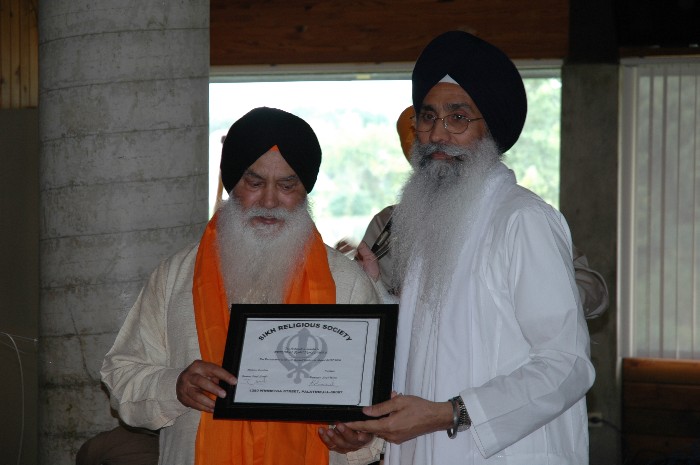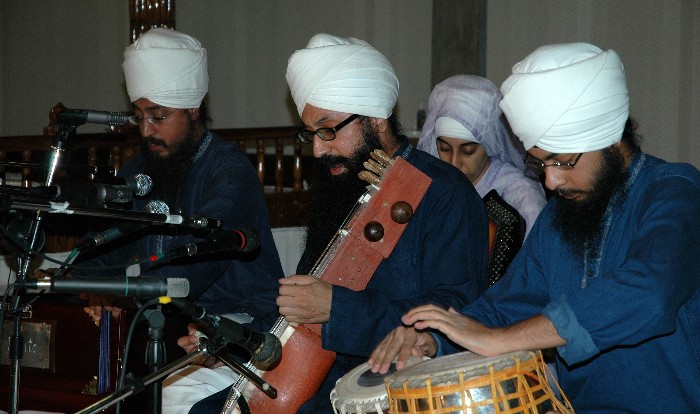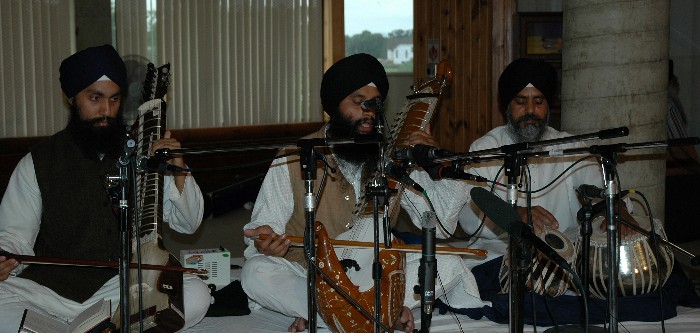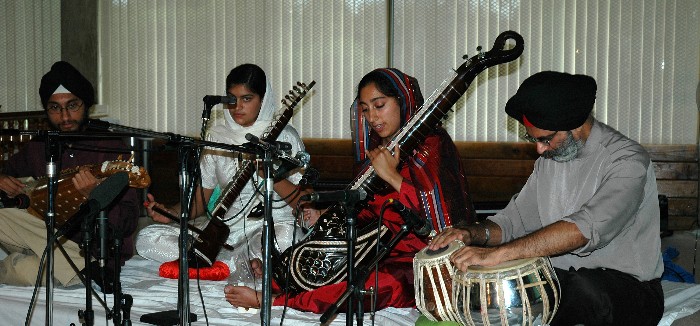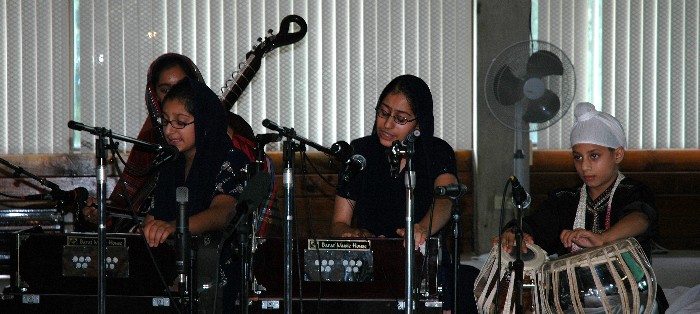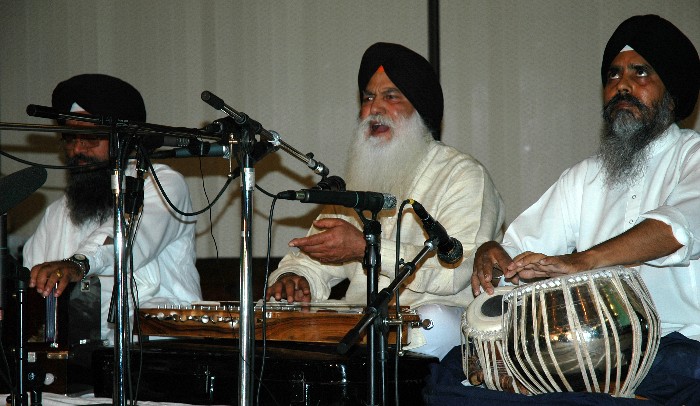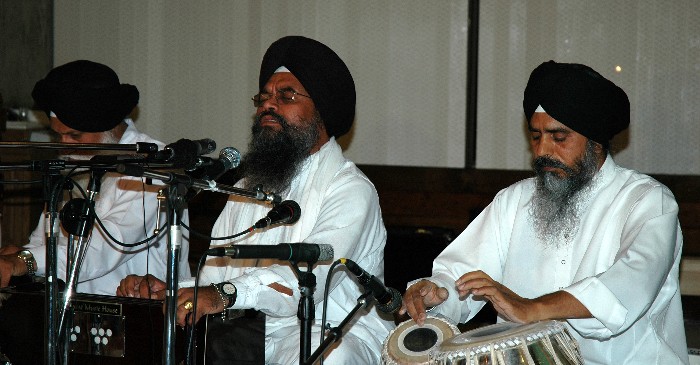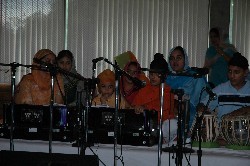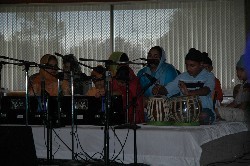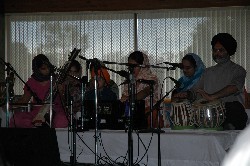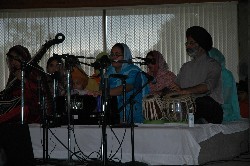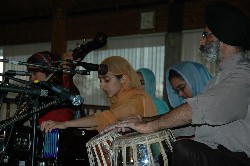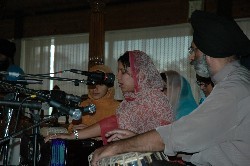|
The
Gurmat Sangeet Project |
|
Dedicated
to the Preservation & Propagation of Gurmat Sangeet |
|
Second
Annual Gurmat Sangeet Darbar
Chicago (Sikh Religious Society, Palatine), August 26-27 2006
Gyani Dyal Singh Ji, Being honored by Bhai Mohinder Singh Ji
The tradition of Gurmat Sangeet has been evolving from the times of the Gurus to the present. Historically this has largely been an oral tradition, which has been handed from generation to generation often from father to son in families that have been associated with Gurmat Sangeet since the times of the Gurus. The absence of a written tradition and the lack of a consistent framework for the documentation and preservation of Gurmat Sangeet has had a devastating effect, as this centuries-old system for the transmission of the tradition has broken down under the pressures of the modern world.
Fortunately, at the turn of the century, a system for musical notation invented by Pandit Vishnu Narain Bhatkhande was adopted for use by S. Gian Singh Abbotabad, who under the auspices of the SGPC, produced two volumes titled Gurbani Sangeet in 1961. These volumes represented the first notable effort to document centuries old compositions that define Gurmat Sangeet and preserve them for posterity. This work was followed by other notable works by Bhai Avtar Singh and Bhai Gurcharan Singh as well as Gyani Dyal Singh of the Rakab Ganj Kirtan Vidyalay.
Despite these excellent efforts, Gurmat Sangeet suffered the onslaught of ‘modernization’, driven largely by the lure of popularity and financial gain, particularly in the last four decades. Ragis increasingly switched to popular tunes which required less effort and could be plagiarized from readily available sources such as film music, discovering that pandering to popular taste was often the shortest path to popularity and riches. The problem was exacerbated by the ready availability of very cheap mass marketed recordings, which further strengthened the grip of the banal form of Kirtan to the detriment of the Gurmat Sangeet tradition.
In recent times, particularly in the Sikh Diaspora, we have been fortunate to witness a reanissance of sorts, where young Sikhs in particular are beginning to show interest in understanding and preserving the traditions of Gurmat Sangeet.
This humble effort is dedicated to the preservation and propogation of traditional Gurmat Sangeet. The intent is to honor and recognize Kirtaniyas who have dedicated their lives to the preservation of the tradition. Another goal is to encourage young Kirtaniyas who have attempted to preserve the tradition and to present them to the Sangat at large, in the process, creating archival material that is truly reflective of the rich traditions of Gurmat Sangeeit.
The second Annnual Gurmat Sangeet Darbar was held at
the Palatine Gurdwara Sahib, the principal Chicago Area Gurdwara on August
26 & 27 . The program began with a workshop titled 'Gurmat Sangeet
Appreciation'. This was followed by Kirtan by young people from the Chicago
Sangat .
The following young Kirtaniyas were invited guests at the Darbar :
Manmeet Singh, Amarpreet Singh & Satpreet Singh (Texas)
Ardent practitioners of Gurmat Sangit, the jathA derives their kirtan inspiration from the late BhAi Dilbagh Singh, late BhAi Dharam Singh Zakhmi, BhAi Balbir Singh, BhAi Avtar Singh, and various rababi & dhAdi jathAs. The Jatha plays the Sarangi, Dilruba, Sarod, Siranda, Taus & Jori While they started learning kirtan at a very young age, their transition from the harmonium to string instruments has been under the tutorship of Ustad Surjit Singh, the protégé of Pt. Ram Narayan. The group is dedicated to the revival and promotion of Gurmat Sangit.
Rupinder Singh & Nampreet Singh (Ontario) accompanied by Bhai Amrik Singh
Rupinder Singhs' passion for kirtan arose from listening to gifted Ragis in Gurdwaras and to classical recordings. Consequently, he was inspired to learn kirtan from local teachers in Toronto. Whereas Nampreet Singh while growing up, had the fortune of being surrounded by his mother’s kirtan along with his brother playing on the tabla, and listening to old kirtan recordings. Their main inspirations, among others, are late BhAi Dharam Singh Zakhmi, Bhai Avtar Singh and Bhai Santa Singh. Today, Rupinder Singh and Nampreet Singh do kirtan in Toronto. Their goal is to motivate others to join them in learning more about our unique Gurmat Sangit tradition.
Lakhpreet Kaur, Paramveer Singh & Sirjaut Kaur (Wisconsin)
Lakhpreet Kaur , Paraveer Singh and Sirjaut Kaur started learning Kirtan from their father at an early age. A visit by the Patiale Valian Bibianto the Milwaukee Gurdwara triggered their interest in stringed instruments. With the encouragement of Bhai Nazar Singh, the family acquired a Dilruba and started studying stringed instruments. Lakhpreet Kaur has been playing the violin for 11 years and recently took up the Dilruba and Taus. Paramveer Singh has played the acoustic guitar for three years and is transferring his skills to the Rabab. Sirjaut Kaur plays piano & tenor saxophone, and has recently started the Dilruba.
Amrit Kaur, Mehr Kaur & Jaspreet Singh (Massachusetts)
Amrit Kaur and Mehr Kaur have been studying Gurmat Sangit and singing together for more than four years with the Gurmat Sangeet Project. In addition to singing at the Milford Gurdwara Sahib, they have participated in several Interfaith Programs and Kirtan DarbArs at various venues in North America. Jaspreet Singh began to play the table at a young age under the tutorship of his father Bhai Gupal Singh, a student of Giani Dyal Singh Ji, and is currently a student of Bhai Amritpal Singh in Boston.
Gyani Dyal Singh Ji was honored at the Gurmat Sangeet Darbar for
a lifetime of Seva in the field of Gurmat Sangeet.
Gyani Dyal Singh is one of the leading figures in the world of Gurmat Sangeet today. He has served as the Principal of the Gurmat Vidyalay at Rakab Ganj in Delhi since 1967. Gyani Dyal Singh was born in the village of Badla Singha in the district of Meerut. In 1946 he came to the Rakab Ganj Gurmat Vidyalay to study Kirtan, Tabla, Sarinda and Dilruba under the tutelage of Gyani Hardit Singh Ji. Gyani Ji spent five years at the Vidyalay as a student. In 1952 he joined the jatha of Bhai Samund Singh, one of the most accomplished Ragis of the century, as his accompanist on the Dilruba. On the recommendation of Bhai Santa Singh Kanwal, he entered the service of Bhai Gian Singh Ji, Abbotabad, who was working on his seminal work, Gurbani Sangeet. Gyani Dyal Singh Ji was given the task of annotating ancient shabad reets (compositions) so that they could be documented in Gian Singh Ji's work. From 1959 to 1964 he served at Sri Harmandir Sahib, playing the Dilruba during Asa Di Var recitals as well as in the Sodar Chauki in the evening. In 1965 he worked again with Gian Singh Ji to provide additional input on Raga Theory, Alaaps etc. for Gian Singh Ji's work - Gurbani Sangeet. In 1967, when Gyani Hardit Singh Ji passed away, the task of running the Gurmat Vidyalay passed to Gyani Dyal Singh Ji with the unanimous support of the leading Ragis and scholars who had gathered to bid farewell to Gyani Hardit Singh Ji. Gyani Dyal Singh has served the Vidyalay and the Sikh Panth with exemplary dedication, often at a great cost to his health and well being. The Vidyalay has produced and continues to produce dedicated and talented Ragis who have kept the traditions of Gurmat Sangeet alive. Prominent among his students are Bhai Surjit Singh (Long Island), Bhai Kanwarpal Singh, Bhai Parkash Singh (New Jersey), Bhai Gupal Singh (Boston) and several others. Gyani Ji has also authored four volumes titled Gurmat Sangeet Sagar, which are a veritable treasure trove of compositions in several Ragas. The compositions include ancient shabad reets that have been passed down through generations, Partals, Dhrupads and Guldastas. Gyani Ji has also authored a book on Table instruction titled Table Mridang Sagar, as well an annotated Asa Di Var, set to multiple Ragas. Gyani Dyal Singh Ji continues to live an extremely austere life and teach at the Gurmat Vidyalay in Delhi. Gyani Ji's contributions to Gurmat Sangeet have played a huge role in inspiring the Gurmat Sangeet Project.
Bhai
Kanwarpal Singh Ji and his Jatha sang Asa Ki Var and accompanied Gyaniji
Bhai Kanwarpal Singh Ji is one of Gyaniji's seniormost students. He studied with Gyaniji at the Rakab Ganj Kirtan Vidyalay in Delhi from 1967 to 1974. He has developed a large repertoire of traditional Gurmat Sangeet compositions and is one of the finest Ragis in the Panth today. Bhai Kanwarpal Singh Ji and his Jatha were invited to the Gurmat Sangeet Darbar to offer Kirtan Seva and provide support for Gyaniji.
This page contains recordings and pictures from the Second Annual Gurmat Sangeet Darbar.
| Shabad |
Singer | Raga |
| Narayan narpat namaskar | Gyani
Dyal Singh Ji |
Darbari Kanada, Malkauns, Kafi, Chandrakauns, Bahar etc. |
| Bhadon bharam bhuli | Gyani Dyal Singh Ji | Megh |
| Sevak ki ardas pyare | Gyani Dyal Singh Ji | Wadhans |
| Preet preet guriya | Gyani Dyal Singh Ji | Suhi |
| Baras megh ji til bilam na lavoh | Gyani Dyal Singh Ji | Miyan Ki Malhar |
| Asa ki var | Bhai Kanwarpal Singh | Asa, Bhairav, Asavari etc. |
| Baras saras agya | Bhai Kanwarpal Singh | Miyan Ki Malhar |
| Charan kamal sang lagi dori | Bhai Kanwarpal Singh | Nat |
| Sabh dukh haro karunamai | Bhai Kanwarpal Singh | Adana |
| Savan aya he sakhi | Bhai Mohinder Singh | Miyan Ki Malhar |
| Halat sukh palat sukh | Amrit Kaur, Mehr Kaur, Jaspreet Singh | Dhanasri |
| Mere lalan ki sobha | Amrit Kaur, Mehr Kaur, Jaspreet Singh | Yaman Kalyan |
| Raj me raj jog me jogi | Amrit Kaur, Mehr Kaur, Jaspreet Singh | Bhupali |
| Ghol ghumai lalna | Amrit Kaur, Mehr Kaur, Jaspreet Singh | Tukhari |
| Baras saras agya | Amrit Kaur, Mehr Kaur, Jaspreet Singh | Miyan Ki Malhar |
| Jin mil mare panch surbir aiso koun bali re | Amrit Kaur, Mehr Kaur, Jaspreet Singh | Asa |
| Tera jan ram rasayan mata | Lakhpreet Kaur, Paramvir Singh, Sirjaut Kaur | Devgandhari |
| Khub khub khub khub tero naam | Lakhpreet Kaur, Paramvir Singh, Sirjaut Kaur | Ahir Bhairav |
| Tum ho sabh rajan ke raja | Rupinder Singh, Nampreet Singh | Bageshri |
| Bhaj ram man ram | Rupinder Singh, Nampreet Singh | |
| Gurmukh pyare aaye mil | Rupinder Singh, Nampreet Singh | Asa |
| Jap man har nam nidhan | Rupinder Singh, Nampreet Singh | |
| Sajna sant aavoh mere | Rupinder Singh, Nampreet Singh | |
| Aaj more aye hain | Manmeet Singh, Amarpreet Singh, Satpreet Singh | |
| Tu samrath vadaa | Manmeet Singh, Amarpreet Singh, Satpreet Singh | |
| Guru Arjan A zumla u | Manmeet Singh, Amarpreet Singh, Satpreet Singh | |
| Prabh ju to ke laaj hamari | Manmeet Singh, Amarpreet Singh, Satpreet Singh | |
| Dhadhi var | Manmeet Singh, Amarpreet Singh, Satpreet Singh | |
| Dhyaiye apna sada hari | Chicago Youth Jatha | Todi |
| Guru Arjan vitoh qurbani | Chicago Youth Jatha | Bhairav |
| In bidh eho man hariya hoye | Chicago Youth Jatha | Basant |
| Kya kahiye kich kahi na jayee | Chicago Youth Jatha | Bhairav |
| Prabh mere antarjami jaan | Chicago Youth Jatha | Yaman Kalyan |
| Savan aya he sakhi | Chicago Youth Jatha | Miyan Ki Malhar |
| Tu thakur tum peh ardas | Chicago Youth Jatha | Bageshri |
Chicago Youth Jatha;
(It would be helpful if someone from Chicago can send us the names of the Kirtaniyas so that we can add captions to the photographs) |
||
|
|
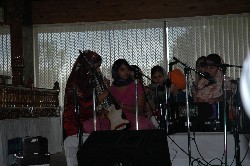 |
|
|
|
|
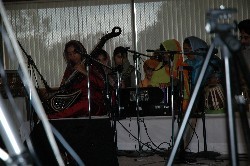 |
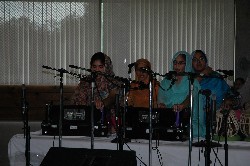 |
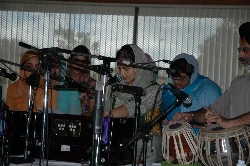 |
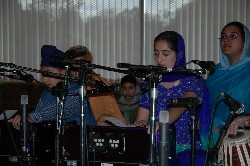 |
| |
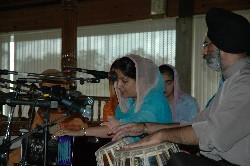 |
|
